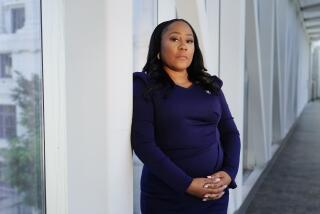Atlanta ordinance would banish convicted prostitutes
- Share via
It’s one of the world’s oldest punishments, often used in Babylon, Greece and Rome. Now city officials in Atlanta want to impose it on the oldest profession.
New legislation proposed in City Hall would prohibit convicted prostitutes, pimps and “johns” from returning to certain areas of the city for any reason. In other words, banishment.
“Right now, my mind’s a little boggled,” said Mona Bennett, programs coordinator for the Atlanta Harm Reduction Coalition, an outreach group that works with sex workers. “Are we stepping back in time?”
Scores of women’s rights advocates, pastors and civil rights activists crammed into a City Hall meeting room Feb. 11 to voice concerns about the legality, practicality and morality of banishment.
Supporters of exclusion zones want to stop sex workers from reoffending and make neighborhoods more tolerable for residents.
Critics say such zones would only move the problem around — further stigmatizing offenders and violating their constitutional rights.
Georgia has long had a reputation as the nation’s most aggressive state in enforcing banishment, with rural counties routinely casting out people convicted of a range of crimes, such as drug possession and shoplifting.
Those pushing Atlanta’s banishment law, however, say they’re inspired by urban governments that restrict the movement of sex workers and other “undesirables.”
In Seattle, judges can make offenders sign “stay out of areas of prostitution” orders that exclude them from areas with high prostitution activity for up to two years. In Charlotte, N.C., those convicted of prostitution can be barred from “prostitution-exclusion zones” for up to a year.
With a “definite uptick” in the use of banishment and other exclusion strategies, courts will likely see more constitutional challenges, said Colin Miller, associate professor of law at the University of South Carolina. Among the legal arguments that can be made against banishment: It’s cruel and unusual punishment; it’s too broad; it violates a citizen’s right to travel.
In Washington, the District of Columbia attorney general’s office warned in January that the district’s temporary prostitution-free zones were probably unconstitutional. A 2006 law allows police to make arrests for up to 20 consecutive days in certain zones if two or more people congregate for the purpose of prostitution. The office recommended amending the law to require that police prove intent.
Atlanta’s proposal is different. It targets convicted offenders, requiring them to stay out of specific neighborhoods with high levels of prostitution during probation, a period of up to 165 days.
Atlanta already has a seldom-used ordinance that allows municipal judges to banish people with two or more prostitution convictions from being inside the city limits. Many county courts also banish people convicted of crimes such as burglary and vagrancy.
Since 1877, Georgia has prohibited banishment from the state, but many judges interpret that as allowing expulsion from every county but one. In 2008, Georgia’s Supreme Court upheld that standard as reasonable in the case of Gregory Mac Terry, who was convicted of stalking and assaulting his estranged wife.
For Peggy Denby, president of the Midtown Ponce Security Alliance, an Atlanta public safety group, banishment is a common-sense probationary tool — one she compares to license suspension after a drunk driving conviction. All too often, she said, prostitutes in Midtown are back on the streets within hours of arrest. “If they can’t come back, they’ll have to go somewhere else,” she argued.
Chad Brock, attorney for the American Civil Liberties Union of Georgia, says the proposed law would serve no rehabilitative purpose and would have a disproportionate impact on sex workers, who tend to work and live in the same area, as opposed to johns.
Such exclusion orders are inherently unworkable, he said, because they fail to distinguish between illegal activity, such as soliciting, and legal activity, such as visiting family. While the order would allow judges to list exemptions, there’s no guarantee that a judge would make exceptions.
Some cities have decided not to renew prostitution-free zones. Others have considered them but concluded they would be unlawful and without rehabilitative value.
Portland, Ore., allowed its exclusion zones to expire in 2007, citing ineffectiveness and discriminatory enforcement. The city then joined with Multnomah County and a nonprofit group to help repeat offenders complete mental health and addiction treatment and obtain housing and employment.
Atlanta Councilman Michael Bond, chairman of the city’s public safety committee, said he had yet to be persuaded against banishment and noted that jail is just as ancient a punishment.
While he welcomed suggestions on how the proposal might be improved, he warned that the city could provide only so much assistance to rehabilitate prostitutes.
“Should we provide more services?” he said. “Of course. But this isn’t a Lifetime movie where every hooker has a heart of gold. We still have to get tough on the problem of prostitution.”
More to Read
Sign up for Essential California
The most important California stories and recommendations in your inbox every morning.
You may occasionally receive promotional content from the Los Angeles Times.














